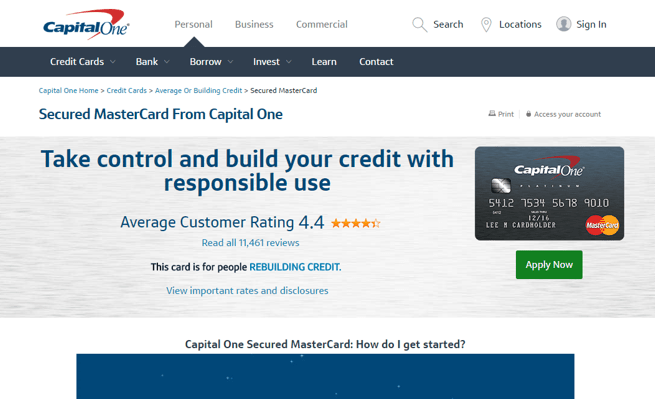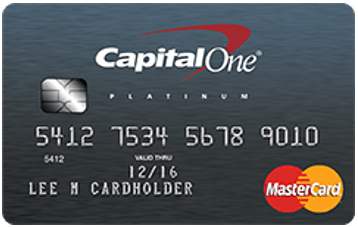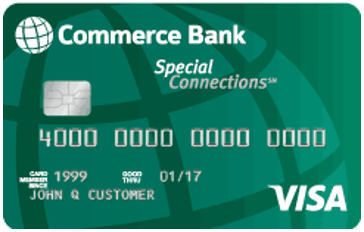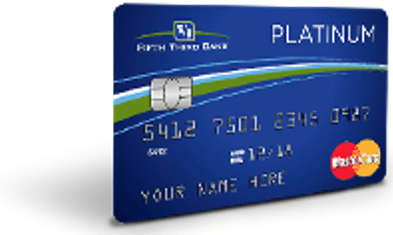Overview—Capital One Secured Card vs. Fifth Third vs. U.S. Bank vs. Commerce Bank
When it comes to building up or establishing your credit, opting for a secured credit card is often the first step.
A secured credit card gives you some flexibility in terms of what a credit card company or lender is able to offer you because of the security it provides them. But how do you know which card is the top choice?
If you’ve been curious about whether the Capital One secured credit card, Fifth Third secured credit card, U.S. Bank Secured Visa® Card, or the Commerce Bank secured credit card is the best, you’re in the right place. AdvisoryHQ wants to help you weigh the advantages and disadvantages associated with each of these three secured cards.
You need to see all of the facts in one convenient location to determine whether the Capital One secured card or one of its competitors is the best fit for you. We’re here to help you consider the annual fees, APRs, minimum deposits, and more.
To help make light work of your extensive research, take a closer look at our comparison of the Capital One secured credit card, U.S. Bank secured card, Fifth Third credit card, and Commerce Bank credit cards. You’ll have a much clearer idea of which one of these companies can offer you the best secured card.
Comparison Review List
The list below is sorted alphabetically:
- Commerce Bank Secured Visa® Credit Card
- Fifth Third Secured MasterCard
- Secured MasterCard from Capital One
- U.S. Bank Secured Visa® Card
High Level Comparison Table
Credit Card Name | Annual Fee | APR | Late Fee |
Commerce Bank Secured Visa® Credit Card | $49 | 18.49% | Up to $15 |
Fifth Third Secured MasterCard | $24 | 24.24% | Up to $35 plus penalty APR of 29.99% |
Secured MasterCard from Capital One | $0 | 24.99% | Up to $35 |
U.S. Bank Secured Visa® Card | $29 | 19.24% | Up to $37 |
Table: The above list is sorted alphabetically
What Is a Secured Credit Card?
Before we can dive too far into our detailed comparison, it’s imperative that you have a thorough understanding of what a secured credit card really is. Taking a closer look at a Capitol One secured card or the Fifth Third secured credit card won’t matter if you don’t understand the details.
A secured card is a tool used by credit card companies and lenders to protect them from financial risk while you work to rebuild your credit. For the most part, cardholders are required to put down a deposit that is going to be equal to their credit limit. The Capital One secured credit card and its competitors in this review are all prime examples of top secured credit cards.



Source: Capital One
By providing the maximum amount of money you are able to spend on your new Capital One secured MasterCard or Commerce Bank credit cards, the bank has a form of collateral if you default on your payments. The minimum deposit amount will vary among the U.S. Bank Secured Visa® Card and its competitors.
Likewise, the length of time the deposit is held will vary from program to program. Some companies prefer to keep your deposit in a savings account (interest-bearing or non-interest-bearing, depending on the card) for a set period of time. Others will require the deposit for the duration of your open account, even if you demonstrate fiscal responsibility with your new U.S. Bank secured credit card.
Overall, a secured credit from any of these four major companies could be a good choice for rebuilding or establishing your credit. Be aware that some consumers find secured credit cards to be cost-prohibitive though. Placing a hefty deposit down upon your account opening may require advanced savings and budgeting on your part before you can move forward on the Capital One secured credit card or others.
Don’t Miss: Discover vs Wells Fargo Secured Credit Card Review | Which Card Is Best?
All-in-One Change Management Tools
Top Rated Toolkit for Change Managers.
Get Your Change Management Tool Today...
Initial Deposit: Capital One Secured Card
Most secured credit cards require a collateral deposit equal to the credit limit they are willing to extend. When you compare the Fifth Third secured credit card, U.S. Bank Secured Visa® Card, and the Commerce Bank secured credit card, you’ll see that this principle holds true.
Only the Fifth Third credit card specifies a minimum deposit amount ($300). However, all three note that your credit limit is going to be equal to the deposit that you place into a savings account with them.
The other unique benefit of these three secured card options is the ability to place your deposit into an interest-bearing savings account. Your money could be hard at work with your new U.S. Bank Secured Visa® Card, Commerce Bank secured credit card, or Fifth Third secured credit card, while you’re working hard to rebuild your credit.
While the first three cards we looked at are definitely great choices when it comes to a secured credit card, the Capital One secured card is a clear winner when it comes to your initial deposit. Depending on the amount of work your credit score needs, you may be eligible to put down a smaller deposit.
A key feature noted in Capital One secured credit card reviews is your potential eligibility for a deposit lower than your actual credit line.



Source: Capital One
Determined by your creditworthiness, you could be eligible for a deposit of just $49 or $99 in exchange for an initial credit line of $200. Of course, you may also be required to put down a deposit equal to the initial credit line.
You also have the option to place down more money in exchange for a higher credit line on your Capital One secured credit card with a maximum of $3,000.
Annual Fee: Capital One Secured Credit Card
Once again, it appears that the Capital One secured card is the winner when it comes to annual fees. When you’re opening a new account, there’s nothing better than finding out that it comes at no cost to you. With the Capital One secured credit card, you’ll pay no annual fees in exchange for your card and account.
This offers the best deal to consumers who are already saving and setting aside funds to cover the initial deposit required with secured cards. The Capital One Secured MasterCard offers the potential for the lowest initial deposits and no annual fees, making it the most cost-effective option to start out with.
The other three companies do have competitive and minimal annual fees as well, though. The Fifth Third Secured MasterCard has the smallest annual fee, coming in at just $24 per year. In terms of budgeting, this is equivalent to setting aside just $2 each month and should be affordable for most consumers.
The U.S. Bank secured card is a close tie with the Fifth Third Bank secured credit card. The annual fee is just a few dollars higher at $29 per year instead of $24.
The Commerce Bank secured credit card ranked the highest of all four with an annual fee almost double that of the Fifth Third Bank secured credit card. The annual fee may be minimal in comparison to rewards cards and other programs but is high for a secured credit card that already requires a large deposit. The annual fee will come in at $49 each year.
Related: Top HSBC Credit Card Offers | Reviews | Top HSBC Hotel, Flight, Rewards Card Offers



Interest Rates: Commerce Bank Secured Credit Card
Comparing the interest rates on various credit cards is critical to making sure that you won’t be overpaying over the lifetime of your account. An APR (or annual percentage rate) is the interest rate that is applied to any balance that remains on your secured credit card past your due date.
Consumers who pay off their balance on a monthly basis need not concern themselves much with the average APRs among the different cards. However, those who opt for a balance that carries from month to month will want to know what it might be costing them in the long run. So which of our top choices for a secured credit card wins when it comes to their APRs?



Source: Commerce Bank
While the Commerce Bank credit cards didn’t really offer much to impress consumers in our first two categories, they definitely win when it comes to the lowest available APRs. Purchases and balance transfers are accompanied with an incredibly low variable APR of just 18.49%.
In comparison, the next closest competitor is the U.S. Bank Secured Visa® Card. This U.S. Bank secured credit card has an interest rate less than one percentage point higher at 19.24% APR. The difference between the U.S. Bank Secured Visa® Card and the Commerce Bank Secured Visa® Card is relatively minimal.
Be prepared for a large jump in the interest rates available through the Capital One secured credit card and Fifth Third Bank secured credit card. The Fifth Third secured credit card is slightly lower than the Capital One secured card at 24.24% APR. Comparatively, the Capital One Secured MasterCard offers an interest rate of 24.99% APR.
As you can see, the Capital One secured card may have taken the trophy for the lowest initial cost, but they come in last place in terms of continued cost. With interest rates more than six points higher than the more competitive Commerce Bank credit cards, you could be paying far more than you’d like to in interest rates.
Popular Article: Best Credit Cards for Bad Credit or No Credit | Guide | How to Find Bad Credit Credit Cards
Late Fees: Commerce Bank Secured Visa® Card
For those who are struggling to rebuild their credit, taking a close look at the fees involved with potential late payments could be key. Late payment fees will typically vary depending on the balance owed at the end of the month. However, you could be facing some pretty hefty fees in addition to penalty APRs for missing your due date.
The Commerce Bank Secured Visa® Card tops the list when it comes to low late payment fees. For balances in excess of $25, your late payment fee is just $15. With no penalty APR mentioned, this makes it the least expensive option if you have a habit of forgetting your due date.
Capital One secured credit card reviews should point out that their late payment fee is relatively in line with others in the industry. A Capital One secured card has a late payment of up to $35, equivalent to the Fifth Third credit card and just $2 less than the U.S. Bank secured card.
The only card out of these four that features a penalty APR is the Fifth Third Bank secured credit card. For six months after the infraction, you’ll be required to pay a penalty APR of a whopping 29.99% until you can demonstrate responsibility for making the minimum payment consistently again.
The high penalty APR can really add up to additional costs on your card if you aren’t careful. If you know that you’re a shopper who consistently makes late payments, the Fifth Third credit card isn’t likely to be a top choice for you. With penalty interest rates just shy of 30%, you’ll be spending a small fortune in excessive fees.
Instead, you should highly consider the Commerce Bank Secured Visa® Card even though it may have a higher initial cost. The interest rates are fairly low overall and the late fee is significantly lower than its competitors.
Benefits: Fifth Third Secured Credit Card and Capital One Secured Credit Card
Among the four secured card choices, they all come with several of the same basic features that consumers might be interested in. For example, all four offer you protection from fraudulent transactions. You’ll enjoy peace of mind with a zero liability policy for unauthorized purchases.
Monitoring your secured credit card is simple, whether you opt for the Capital One secured card, Fifth Third secured credit card, U.S. Bank Secured Visa® Card, or Commerce Bank secured credit card. All offer online banking to assist you with watching your transactions and keeping your spending in check. This flexibility can even help you to make your bill payments easier than ever.
Of course, they also come with standard features that make traveling more restful and can save you a few dollars as well. Consider that all four will offer you auto rental insurance when you pay for your car rental on your secured card.
The Capital One secured card, Fifth Third secured credit card, and Commerce Bank Secured Visa® Card all offer travel accident insurance or travel assistance. Useful if you plan to travel to far-off locales, they can help with stolen or lost luggage, medical care, and more, depending on the specifics of your policy.



Source: Personal Banking – Credit Cards
The Fifth Third secured credit card and the Capital One secured credit card offer the most in the way of additional benefits. Both of these cards will also offer the following features:
- Roadside assistance available 24/7
- Extended warranties on items purchased with your card at no cost
- Price protection to reimburse you if items are priced lower within 60 days of purchase (restrictions apply)
The Fifth Third secured credit card also offers cardholders access to an airport concierge to simplify your flying experience. You receive a 15% savings when booking services that make your flying experience more luxurious when you schedule them through the accompanying website.
Read More: Best American Express Credit Cards | Ranking & Reviews | Top AMEX Credit Cards
Free Wealth & Finance Software - Get Yours Now ►
Conclusion: Which Card is the Best?
Deciding among the Capital One Secured MasterCard, the Fifth Third secured credit card, the U.S. Bank Secured Visa® Card, and the Commerce Bank Secured Visa® Card is a highly personal decision. The decision will ultimately reflect your spending preferences, personality, and your ability to cover the initial costs of each potential card.
Capital One secured credit card reviews receive the highest rating when it comes to a low initial cost and additional benefits but suffer when it comes to APRs and late fees. Likewise, the Fifth Third secured credit card has areas where it shines brightest and downfalls including penalty APRs.
All four cards have unique advantages and disadvantages that make them well-suited to specific types of consumers. Consider evaluating your spending habits and your savings account to determine whether the U.S. Bank secured credit card or the Commerce Bank credit cards may be a good fit for you instead.
While they all have their own benefits, there’s likely to be one that is a better fit for your wallet than the others. Will it be the Capital One secured card, the Fifth Third secured credit card, the U.S Bank Secured Visa® Card, or the Commerce Bank Secured Visa® Card? The answer is completely up to you.
AdvisoryHQ (AHQ) Disclaimer:
Reasonable efforts have been made by AdvisoryHQ to present accurate information, however all info is presented without warranty. Review AdvisoryHQ’s Terms for details. Also review each firm’s site for the most updated data, rates and info.
Note: Firms and products, including the one(s) reviewed above, may be AdvisoryHQ's affiliates. Click to view AdvisoryHQ's advertiser disclosures.





